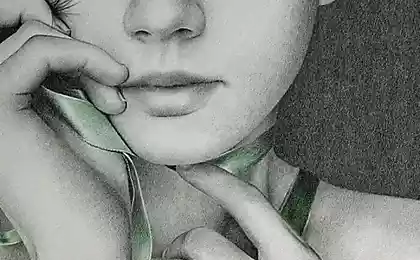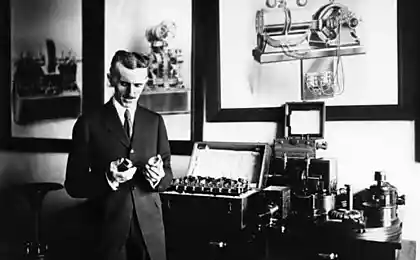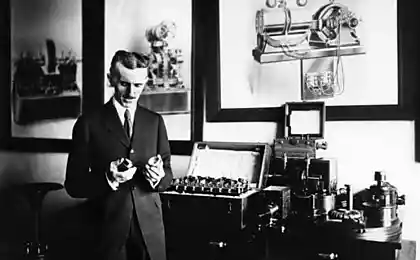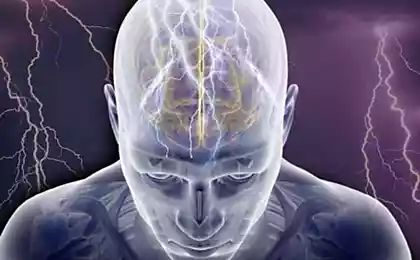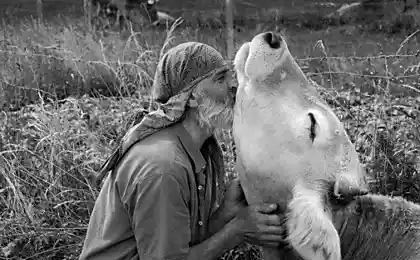184
Unherd instinct: what is social phobia
We try to be tolerant of people “with serious problems”, but meeting an unsociable acquaintance who is only able to burrow something, without looking the interlocutor in the eye, many are ready to attribute his behavior to a bad character, an idiot or dislike of humanity. Is it really that hard to pull yourself together and have a simple conversation? Actually, yes.
What suffering is experienced by a person with social phobia, how it differs from introversion and what does mirror neurons have to do with it?

© Lucy Glendinning
She's real. Psychiatry is traditionally, albeit unofficially, divided into “big” and “small”. And people far from medicine, the difference between them seems much more fundamental than the psychiatrists themselves. Questions about whether dementia or schizophrenia are real diseases are not accepted - but in any discussion of neurotic disorders, including social phobia, there is necessarily someone who strongly advises to throw the dope out of your head, gather up, not sour and finally take yourself in hand.
It is difficult to blame ordinary people for this approach – it is easy to believe that hallucinations in the head cannot be turned off by willpower, just as arthritis and migraines cannot be turned off. But the belief that someone seriously can not talk to the seller in the store or just go out on a crowded street, is much more difficult. The conclusion that social phobia is a convenient excuse for lazy people suggests itself.
But doctors disagree with this view. Social phobia came to the attention of scientists for a long time. The first described case of this disease belongs to the middle of the XIX century. Since then, there has been a lot of research on the disorder, and according to available data, it occurs quite often. 13% of people have experienced it at least once, and 2.5% live in this state all their lives.
Social phobia is often confused with introversion and sociopathy, but these are not the same thing. Introversion is the tendency of a person to focus on his inner world and restore strength in loneliness. A healthy introvert does not often need to be social, but does not feel the stress of having to talk to someone. Sociopathy, or dissocial personality disorder, implies primarily antisocial behavior, not fear of other people. A sociopath observes social norms only as long as they benefit him, and he can be both an introvert and aspire to be the king of parties. And finally, social phobia is distinguished by an irrational fear of communication and attention of others. If you take examples from movies and TV series, then, say, Walter White and Jon Snow are introverts, Sherlock performed by Cumberbatch is a sociopath, and Fester Addams from the Addams Family is the most classic social phobia.
There are hypotheses according to which social phobia is inherited, but they have not yet been confirmed, and the occurrence of the disorder is rather explained by psychological reasons. Parents, being social phobias themselves, can pass on the corresponding model of behavior to the child. Also, social anxiety is formed in children, whom moms and dads are demonstratively compared with their “good” peers, especially if the child is reproached for his unsociableness and unwillingness, as it should, to make friends. Without these noble parental impulses, children are much more likely to grow up psychologically healthy.
Lectures about the dangers of loneliness do not motivate young introverts to seek company, but they form a sense of original otherness. In addition to the family, social anxiety can develop in a child at school, due to public and rude attacks of teachers ("Have you forgotten your head?") and ridicule of peers, as well as at the university, where frustration due to a heavy load and fear of failure, demonstrate their own "unfitness".
A closed circleThe fear of looking stupid, making a mistake in public and being ridiculed, the fear of external evaluations manifests itself differently in different people. Often the phobia is very specific – for example, a person is embarrassed to eat in the presence of others or use a public toilet, give presentations or make phone calls, and cope with other tasks normally. However, the thought of any communication can also cause discomfort. Attempts to calm social phobias with phrases like “look, they all treat you well” do not work – people with social anxiety suffer from “selective blindness” to the emotions of others: they see hatred, contempt and condemnation perfectly even when they are not there (the feeling of their own insight can be very convincing), but they do not see positive emotions towards themselves.
At the same time, the need for acceptance by social phobias does not go anywhere, and many of them sincerely try to join society, to establish relationships, for example, with colleagues at work. But in order to decide to try, it is necessary to turn off the intrusive inner voice that indicates that others are hostile. So, feedback, establishing communication, social phobias almost do not feel - so they can inadvertently step on other people's borders and face a very real negative reaction. Which further convinces them of the need for lifelong isolation – thus a vicious circle.
And, finally, the constant fear of being judged and condemned forms a defensive reaction - social phobias have a very specific attitude towards people around them, who seem to be just waiting for the opportunity to laugh at them. So social phobia often chooses alienation itself - why try to approach someone who is obviously hostile to you?

Crooked mirrorNeurophysiologists also explain the problem. In the 1990s, a group of Italian researchers published the first paper on a group of neurons in the human brain that are responsible for imitative behavior in animals. These neurons are called mirror neurons. Imitation is more than yawning while watching another yawner. It is imitation that underlies empathy, that is, the ability to understand and empathize with the emotions of others, at the heart of language and speech. Without it, the development of culture and the emergence of civilization would be impossible. Serious disorders in the work of mirror neurons, found, for example, in autistics, make people unable not only to empathize, but even to understand how others in principle are arranged.
The brains of people with social anxiety also have their own characteristics. For each case of rejection, ridicule (no matter whether they are real) immediately respond to the parts of the brain responsible for fear and anxiety, the nervous system is connected to the process, and sociophobes experience real pain - scientists have already proved that our body perceives psychological discomfort in the same way as the physical.
No wonder people with social anxiety develop behavioral strategies to avoid others. In particular, they reduce the activity of mirror neurons and, therefore, the level of empathy in general. And gradually, social phobias quite sincerely begin to think that the people around them really are not particularly interesting.
It should be noted that most people, meeting friends on the street, do not try to talk to them about new scientific discoveries and acute social issues. People discuss the weather, gas prices, the boss’s character and other insignificant things. Talking about nonsense is actually more important than it seems — mirror neurons are active in these moments, and people talk to each other about their empathic connection, their ability to empathize and share feelings. They don’t need to understand it on a conscious level, they feel it.
But social phobias do not feel. They sincerely believe that conversations in the smoking room about the common cold of children and the choice of birthday gifts are not worth participating in, and demonstrate only the general stupidity of those who are interested in them.
Of course, chatter about small things can seem boring and not social phobias. But only they see it as evidence of their own dissimilarity with others.
Avoidant behavior leads social phobias to a specific lifestyle - they have difficulties with getting a job, with addictions (and especially cyber addictions), which ultimately forms the approach described by the classic - "don't leave the room, don't make a mistake." This is how the Japanese hikikomori movement came to be. More than a million Japanese teenagers and young adults have dropped out of school and work in order to lock themselves in their rooms, cut off all real social contacts and live largely at the expense of their parents. According to scientists, the prevalence of the phenomenon in the Land of the Rising Sun is due to two factors: the tendency to reclusiveness, inherent in the mentality of the Japanese, and the traditional upbringing, according to which children at the age of 5 years pass from a state of complete permissiveness to a very rigidly regulated world, subject to great stress.
A kind word and a gun.As a rule, social phobias seek medical help only when social anxiety is accompanied by other neurotic disorders. This is because they tend to look for the cause of their social isolation in their own shortcomings or excessive timidity. Social phobias who have learned (and believed) that their problem is a well-studied disease that can be treated can be called lucky. But the willingness to be treated is not enough. Psychotherapy for social anxiety takes a long time and can be quite painful. And since people with social phobia have trained for years to avoid pain, not all of them successfully complete the course of treatment.
Psychotherapy is not the only thing that modern medicine can offer people with social anxiety, and the drug treatment of social phobia is quite common practice. As a rule, antidepressants and drugs that relieve symptoms that accompany social anxiety, such as heart palpitations, are used.
None of the above, by the way, does not guarantee the absence of relapses in the future. So it is likely to be treated regularly for many years. However, not everyone strives for a cure - after all, you can work at home, and in the absence of developed empathy - what kind of joy is it to discuss the weather and repair with former classmates?
P.S. And remember, just by changing your consciousness – together we change the world!
Source: theoryandpractice.ru
What suffering is experienced by a person with social phobia, how it differs from introversion and what does mirror neurons have to do with it?

© Lucy Glendinning
She's real. Psychiatry is traditionally, albeit unofficially, divided into “big” and “small”. And people far from medicine, the difference between them seems much more fundamental than the psychiatrists themselves. Questions about whether dementia or schizophrenia are real diseases are not accepted - but in any discussion of neurotic disorders, including social phobia, there is necessarily someone who strongly advises to throw the dope out of your head, gather up, not sour and finally take yourself in hand.
It is difficult to blame ordinary people for this approach – it is easy to believe that hallucinations in the head cannot be turned off by willpower, just as arthritis and migraines cannot be turned off. But the belief that someone seriously can not talk to the seller in the store or just go out on a crowded street, is much more difficult. The conclusion that social phobia is a convenient excuse for lazy people suggests itself.
But doctors disagree with this view. Social phobia came to the attention of scientists for a long time. The first described case of this disease belongs to the middle of the XIX century. Since then, there has been a lot of research on the disorder, and according to available data, it occurs quite often. 13% of people have experienced it at least once, and 2.5% live in this state all their lives.
Social phobia is often confused with introversion and sociopathy, but these are not the same thing. Introversion is the tendency of a person to focus on his inner world and restore strength in loneliness. A healthy introvert does not often need to be social, but does not feel the stress of having to talk to someone. Sociopathy, or dissocial personality disorder, implies primarily antisocial behavior, not fear of other people. A sociopath observes social norms only as long as they benefit him, and he can be both an introvert and aspire to be the king of parties. And finally, social phobia is distinguished by an irrational fear of communication and attention of others. If you take examples from movies and TV series, then, say, Walter White and Jon Snow are introverts, Sherlock performed by Cumberbatch is a sociopath, and Fester Addams from the Addams Family is the most classic social phobia.
There are hypotheses according to which social phobia is inherited, but they have not yet been confirmed, and the occurrence of the disorder is rather explained by psychological reasons. Parents, being social phobias themselves, can pass on the corresponding model of behavior to the child. Also, social anxiety is formed in children, whom moms and dads are demonstratively compared with their “good” peers, especially if the child is reproached for his unsociableness and unwillingness, as it should, to make friends. Without these noble parental impulses, children are much more likely to grow up psychologically healthy.
Lectures about the dangers of loneliness do not motivate young introverts to seek company, but they form a sense of original otherness. In addition to the family, social anxiety can develop in a child at school, due to public and rude attacks of teachers ("Have you forgotten your head?") and ridicule of peers, as well as at the university, where frustration due to a heavy load and fear of failure, demonstrate their own "unfitness".
A closed circleThe fear of looking stupid, making a mistake in public and being ridiculed, the fear of external evaluations manifests itself differently in different people. Often the phobia is very specific – for example, a person is embarrassed to eat in the presence of others or use a public toilet, give presentations or make phone calls, and cope with other tasks normally. However, the thought of any communication can also cause discomfort. Attempts to calm social phobias with phrases like “look, they all treat you well” do not work – people with social anxiety suffer from “selective blindness” to the emotions of others: they see hatred, contempt and condemnation perfectly even when they are not there (the feeling of their own insight can be very convincing), but they do not see positive emotions towards themselves.
At the same time, the need for acceptance by social phobias does not go anywhere, and many of them sincerely try to join society, to establish relationships, for example, with colleagues at work. But in order to decide to try, it is necessary to turn off the intrusive inner voice that indicates that others are hostile. So, feedback, establishing communication, social phobias almost do not feel - so they can inadvertently step on other people's borders and face a very real negative reaction. Which further convinces them of the need for lifelong isolation – thus a vicious circle.
And, finally, the constant fear of being judged and condemned forms a defensive reaction - social phobias have a very specific attitude towards people around them, who seem to be just waiting for the opportunity to laugh at them. So social phobia often chooses alienation itself - why try to approach someone who is obviously hostile to you?

Crooked mirrorNeurophysiologists also explain the problem. In the 1990s, a group of Italian researchers published the first paper on a group of neurons in the human brain that are responsible for imitative behavior in animals. These neurons are called mirror neurons. Imitation is more than yawning while watching another yawner. It is imitation that underlies empathy, that is, the ability to understand and empathize with the emotions of others, at the heart of language and speech. Without it, the development of culture and the emergence of civilization would be impossible. Serious disorders in the work of mirror neurons, found, for example, in autistics, make people unable not only to empathize, but even to understand how others in principle are arranged.
The brains of people with social anxiety also have their own characteristics. For each case of rejection, ridicule (no matter whether they are real) immediately respond to the parts of the brain responsible for fear and anxiety, the nervous system is connected to the process, and sociophobes experience real pain - scientists have already proved that our body perceives psychological discomfort in the same way as the physical.
No wonder people with social anxiety develop behavioral strategies to avoid others. In particular, they reduce the activity of mirror neurons and, therefore, the level of empathy in general. And gradually, social phobias quite sincerely begin to think that the people around them really are not particularly interesting.
It should be noted that most people, meeting friends on the street, do not try to talk to them about new scientific discoveries and acute social issues. People discuss the weather, gas prices, the boss’s character and other insignificant things. Talking about nonsense is actually more important than it seems — mirror neurons are active in these moments, and people talk to each other about their empathic connection, their ability to empathize and share feelings. They don’t need to understand it on a conscious level, they feel it.
But social phobias do not feel. They sincerely believe that conversations in the smoking room about the common cold of children and the choice of birthday gifts are not worth participating in, and demonstrate only the general stupidity of those who are interested in them.
Of course, chatter about small things can seem boring and not social phobias. But only they see it as evidence of their own dissimilarity with others.
Avoidant behavior leads social phobias to a specific lifestyle - they have difficulties with getting a job, with addictions (and especially cyber addictions), which ultimately forms the approach described by the classic - "don't leave the room, don't make a mistake." This is how the Japanese hikikomori movement came to be. More than a million Japanese teenagers and young adults have dropped out of school and work in order to lock themselves in their rooms, cut off all real social contacts and live largely at the expense of their parents. According to scientists, the prevalence of the phenomenon in the Land of the Rising Sun is due to two factors: the tendency to reclusiveness, inherent in the mentality of the Japanese, and the traditional upbringing, according to which children at the age of 5 years pass from a state of complete permissiveness to a very rigidly regulated world, subject to great stress.
A kind word and a gun.As a rule, social phobias seek medical help only when social anxiety is accompanied by other neurotic disorders. This is because they tend to look for the cause of their social isolation in their own shortcomings or excessive timidity. Social phobias who have learned (and believed) that their problem is a well-studied disease that can be treated can be called lucky. But the willingness to be treated is not enough. Psychotherapy for social anxiety takes a long time and can be quite painful. And since people with social phobia have trained for years to avoid pain, not all of them successfully complete the course of treatment.
Psychotherapy is not the only thing that modern medicine can offer people with social anxiety, and the drug treatment of social phobia is quite common practice. As a rule, antidepressants and drugs that relieve symptoms that accompany social anxiety, such as heart palpitations, are used.
None of the above, by the way, does not guarantee the absence of relapses in the future. So it is likely to be treated regularly for many years. However, not everyone strives for a cure - after all, you can work at home, and in the absence of developed empathy - what kind of joy is it to discuss the weather and repair with former classmates?
P.S. And remember, just by changing your consciousness – together we change the world!
Source: theoryandpractice.ru

